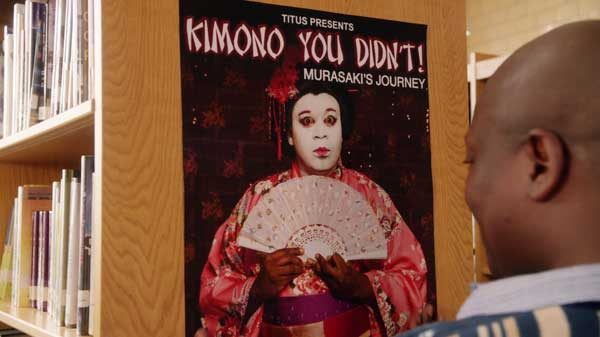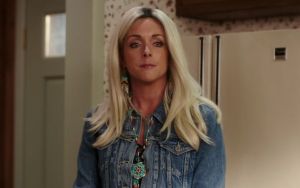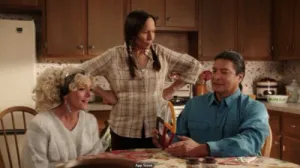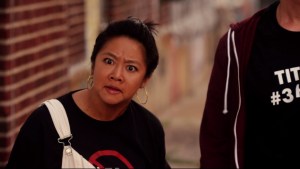Unbreakable Kimmy Schmidt S2: Tina Fey and Robert Carlock’s Hate Letter to the Internet

When Unbreakable Kimmy Schmidt first premiered on Netflix last year, it was a revelation. Not only was is a female-led, predominantly female comedy co-created by one of the smartest women in comedy, but the protagonist is someone who’s managed to survive a trauma while keeping her kindness and hopefulness in tact. Theeeeeen….there was the stuff about Native Americans.
In Season One of UKS, we were introduced to Kimmy’s boss Jaqueline, played by Jane Krakowski. She seemed like your standard out-of-touch, superficial, wealthy white Stepford Wife. But by Episode Three, we learn that she’s not as white as she appears. She’s actually Native American with Lakota Sioux parents. While the show itself was unique, smart, and insightful about many other topics, the choice to make a white actress play a Native American character just for the cheap laugh that comes with the “unexpected?”
Around the time of the episode, Kalya Kumari at A.V. Club talked about the fact that the storyline wasn’t inherently problematic, it was just executed poorly:
“As a mixed race and often white-passing person myself, pretending to be white is a reality I’m all too familiar with. But Kimmy Schmidt doesn’t seem like the right show to tackle that. Or, more accurately, the very white Jane Krakowski doesn’t seem like the right actor to tell this story. It’s a whitewashed plot about whitewashing. And it just feels off. Krakowski should not be playing a Native American character, even one who has decided to pretend to be white.”
Meanwhile, Libby Hill at Vulture made this observation:
“Is there any other race Krakowski could have played without raising a substantial uproar? … If we take the show at its word, we are laughing at a Native American woman who felt so uncomfortable in her skin and in not being a member of the dominant culture, she sold her soul to look the way she thought she should. That’s not funny; it’s disturbing. Not just because the pressure to Anglicize exists for so many cultures in America today, but because of how this very country systematically stripped the Native American people not only of their culture, but of their lands, too, not so very long ago.”
The folks over at Indian Country Today Media Network offered a great solution in their write-up about the reaction to UKS Season One, “Unbreakable Kimmy Schmidt Has Two Native American Actors. It Needed Three”:
“Here’s another way we could have gotten there: Keep the Native American character, and hire a Native American actress, one who looks like she might share a single gene with pappy Gil Birmingham, to play her. Irene Bedard and Kimberly Norris Guerrero are contemporaries of Krakowski, either of them with dyed-blonde hair would be funny—funnier than a white woman playing a Native who is passing as white. When a character is passing as another race, the comedic question is Who does she think she’s fooling? But instead of a joke within the narrative, any moderately intelligent viewer is more likely to feel like the show’s creators are trying to pull a fast one: Do they really expect us to believe she’s Native American?“
Now, Jane Krakowski is a draw. I understand writing for her wanting to include her in the show. So, here’s the other solution: don’t make that the story at all. There are a million ways to tell the story of a woman who’s ashamed of her family and leaves for the big city to be “better” than she was. Hell, simply having her parents be really, really poor rednecks would’ve had a lot of the same beats and could’ve been equally funny. So, why rope Native Americans into it?
Obviously, no group is a monolith, and there were Native Americans in the comments of the above articles, as well as in others who are supportive of the show, and were grateful that there was a Native American storyline to begin with. I completely understand that. After all, how many Native American characters can you name from your favorite TV shows?
*plays Jeopardy! theme song, which is basically “I’m a Little Teapot”*
The point is, this is a complex conversation, but an important one. One that should not only be happening, but should be seen as a boon to storytelling in all media. It’s not about what side of the argument one falls on. It’s about the fact that us talking about this at all means that we all, on some level, are trying to make what we believe are the right choices. It feels like Tina Fey and Robert Carlock, the creators of UKS, were attempting to increase diversity with this storyline, and I can’t entirely hate on a show that wants to employ awesome Native actors like Gil Birmingham and Sheri Foster, who play Jaqueline’s parents, Virgil and Fern White. Still, when the creators of a show are considering how it can become more diverse, they have to think in a more nuanced way.
And they have to take part in the ensuing conversation, doing more listening than talking.
You awesome TMS readers may notice that, whenever I write something here on the site that might be “controversial,” or even misguided or flat-out wrong, you’ll often find me somewhere in the comments section: talking to people, explaining where I’m coming from, trying to understand other viewpoints, and if convinced, admitting when I’m wrong. That’s because I believe that when a writer takes part in a conversation, that conversation isn’t just one-way. It’s not about a writer putting something out into the world and leaving it there as their final word. It’s about putting the work out there, hearing what readers/viewers have to say, and engaging with them. That’s the beauty of the written word. It sparks two-way conversations that move ideas and culture forward.
Yet, both Carlock and Fey are of the opinion that “the work should speak for itself.”
At The Wrap, Carlock is quoted as saying, ““I prefer to let the episodes speak for themselves. Our intention is not to offend — our intention is to be part of an important conversation. I completely understand that for some people there are litmus tests — there’s an either/or. There are some things that you’re just not allowed to do. We don’t think that’s true. And we don’t think we’re doing the thing from a context and story point of view that those litmus tests were invented for.”
So, he wants the show to be a part of an important conversation, but when the conversation comes back around, he doesn’t want to take part in it?
Meanwhile, here at TMS, we’ve already talked about how Fey is “opting out” of our “culture of demanding apologies.” Except that it’s not about apologies. It’s about listening, learning, and doing better next time.
As a writer myself who both loves the Internet, and understands how utterly soul-crushing internet comments can be, I still don’t understand the knee-jerk aversion to engaging with fans and viewers raising important points, expecting people to simply accept your work without question. At least, without questions that you deem uncomfortable.
And if you really don’t want to engage, then why are you giving soundbites about how you don’t want to engage? Just…don’t engage. But in the cases of Fey and Carlock, they seem to feel the need to engage, they just want to maintain the high ground, using their soundbites to criticize fans for criticizing them.
And so, since their work speaks for itself, as well as for them, Fey and Carlock seemed to have put all their responses to “Internet call-out culture” into Season Two of UKS, and that snarky, tone toward “those internet haters” that was imbued throughout the season took away from the humor in the season. It happened throughout, but it was most apparent in Episode 3 of Season 2, “Kimmy Goes to a Play!”
In it, Tituss decides to create “every actor’s friend’s favorite thing. A one-man show!” However, it turns into a one-woman show when he decides to perform the role of one of his “past lives,” a Japanese geisha named Murasaki. As could be expected in the real world, Tituss discovers internet discussion about his play where people are criticizing, among other things, the fact that a black man is playing a Japanese woman. (Sound familiar?) When he encounters members of the internet forum primarily responsible for the criticism, Respectful Asian Portrayals in Entertainment (RAPE as an acronym? Really?), they say things like “I don’t want to hear the end of anything anyone has to say!”
Tituss voices confusion concerning the criticism, not understanding why it could ever be wrong for him to play Murasaki when “I am/she was me/her!” This is probably the same confusion that arose when Carlock and Fey didn’t understand why anyone would object to their Native American storyline from Season One when they cast two Native Actors, and had a writer with Native American ancestry saying that it was okay.
When Kimmy asks, “How can they criticize something they haven’t even seen?” Tituss replies, “Because that’s what the internet is. Just anonymous hosers criticizing geniuses.”
In the world of this show, the internet is totally valueless, except as a source of cute bunny and kitty videos. Any conversation and criticism that happens on the internet is all lumped together, rather than separating the abuse from the genuine criticism and concern. Anyone who expresses a concern about the portrayal of race or gender in stories on the internet is seen as being too “politically correct.”
What felt especially tone-deaf about this storyline is that Tituss, as a black gay man who lives on the internet despite not having internet access himself, 1) knows how the internet is, and 2) might have similar feelings about portrayals of black or LGBTQIA people. I want to believe that putting this in Tituss’ hands was a way for Carlock and Fey to address their own blind spots. Much like Tituss might be offended by an insensitive portrayal of a black, gay man, but be totally oblivious to how Asians might feel about the same treatment, perhaps this was Carlock and Fey’s way of acknowledging that yes, while they were more successful on other storylines, perhaps Native Americans were a blind spot, but they can’t turn back now that they’ve committed.
When Tituss and Kimmy confront some members of RAPE, one of the group members, upon hearing that Tituss is basing his play on a past life says “past lives? That’s ridiculous!” only to have a Hindu member of the group call him out for it. See? Everyone has blind spots! This is something we all have to talk about and work through, right?
Apparently not. The episode ends with the RAPE members going to the show only to be so moved by Tituss’ performance that they become really forgiving and forget how upset they were. So, it’s not that the conversation has become more nuanced, it’s that these “stupid internet people” have “come to their senses” and realized that a black man can play a Japanese woman if it’s done well enough. Now, regardless of what your opinion is on that (whether the quality of the performance affects whether or not one can play someone from outside the marginalized group), the fact is that there was no credence given to the concerns of the group. It was all about Tituss’ right to do the play, and nothing at all about legitimate criticism of a piece. One of the group members even says that she “doesn’t know how to feel” now that she’s not offended.
*sigh*
Too often, showrunners bring up their right to tell the stories they want without giving enough consideration to the people they expect to watch the shows they create. They see any talk about diversity as a hindrance, when they should be embracing it as an opportunity. It’s funny, whenever artists talk about money, they say things like “You wouldn’t pay your doctor ‘with exposure,’ would you?” No, you wouldn’t. Now, if an artist is willing to see their work, in part, as a business so that they can make a living, they should also be taking “customer” feedback (or rather, audience feedback) into account. Rather than disengaging from it, they should be considering it, because that’s good business. And no, you may not agree with everything the customer has to say, but you also shouldn’t shame them for being critical in the first place.
Season Two of Unbreakable Kimmy Schmidt was less funny and less effective than the first season, because it spent too much of its time being a snarky critique of the critical viewer. That was particularly frustrating considering that for every moment of Murasaki, there was also a great race moment, like when Kimmy goes to school and tells the black secretary that she and Dong have a “Frasier and Roz thing” going on. When the secretary says that she and her boss had a “Kyle/Maxine thing going on,” and Kimmy is confused, she retorts, “Oh, you don’t know Living Single, but I’m supposed to know Frasier?” Zing!
They’re clearly trying in certain areas. They clearly know how to do effective critique on the concerns facing marginalized groups. So, when they don’t do so as effectively, one would think that they’d be open to hearing about it. I agree with Kimmy that “anonymous insults are wrong!” However, not everyone who’s criticizing you is insulting you. Everyone is not a “hater” simply because they don’t approve of the way you tell a story. Sometimes, you just screwed up. Sometimes, they just don’t like it. Regardless, your viewers should be able to talk to you about your work without being made to feel like assholes for not enjoying it.
Does Unbreakable Kimmy Schmidt even know that it’s a show that exists entirely on the internet? It criticizes “internet culture” as if it were a broadcast network show. Despite having shifted mediums, Fey and Carlock don’t seem to know or want to learn very much about it, and still write from an old-school television place. As it is, the final episode, “Kimmy Finds Her Mom!” was amazing, Tina Fey’s acting performance as a drunk therapist was hilarious, and Ellie Kemper remains a treasure. If only they would’ve spent more of Season Two learning from the mistakes of Season One rather than spending a good chunk of it criticizing internet criticism, it might have been more enjoyable.
Want more stories like this? Become a subscriber and support the site!+
—The Mary Sue has a strict comment policy that forbids, but is not limited to, personal insults toward anyone, hate speech, and trolling.—
Follow The Mary Sue on Twitter, Facebook, Tumblr, Pinterest, & Google+.
Have a tip we should know? [email protected]



